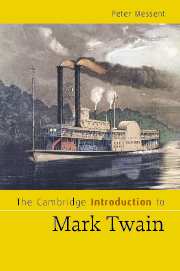4 - Critical reception and the late works
Published online by Cambridge University Press: 05 June 2012
Summary
Huckleberry Finn has long been recognised as Twain's most important work and the lion in the path of anyone who would assess his career. In 1913, H. L. Mencken delivered his credo (statement of belief) in the novel's importance:
I believe that Huckleberry Finn is one of the great masterpieces of the world, that it is the full equal of Don Quixote and Robinson Crusoe … I believe that it will be read by human beings of all ages … long after every book written in American between the years 1800 and 1860, with perhaps three exceptions, has disappeared entirely save as a classroom fossil. I believe that Mark Twain had a clearer vision of life, that he came nearer to its elementals and was less deceived by its false appearances, than any other American who has ever presumed to manufacture generalizations, not excepting Emerson. I believe that, admitting all his defects, he wrote better English, in the sense of cleaner, straighter, vivider, saner English, than either Irving or Hawthorne … I believe that he was the true father of our national literature, the first genuinely American artist of the blood royal.
These words of praise have been echoed by numerous others – if rarely with the same intensity. They suggest the book's literary status in America, its position (until very recently) as a core canonical text standing alongside such others as Moby Dick, The Scarlet Letter and The Great Gatsby.
- Type
- Chapter
- Information
- The Cambridge Introduction to Mark Twain , pp. 109 - 119Publisher: Cambridge University PressPrint publication year: 2007



